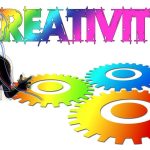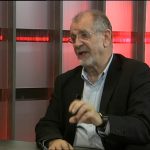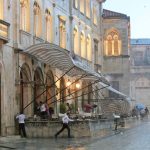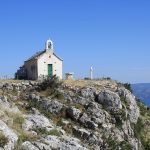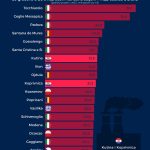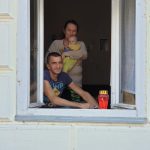Gaella Gottwald is the kind of person with whom every conversation turns out to be a life-changing experience after which you will find yourself questioning the community values, environment issues and all the other things you thought you already knew. We grabbed a cup of coffee… Ok let’s be honest here. Rewind. We grabbed more that one glass of Dingač wine and discussed her inspiring life story and her cultural initiatives in Dubrovnik and we found out what she thinks about the Croatian strategies for development, particularly when it comes to tackling issues with the growing trend of mass tourism.
Sentences like: “I think in Croatia perhaps politics are too active and people have become too passive. (…) That resignation though is dangerous, since it makes one believe that they cannot change their reality…” really strike a chord in today’s time of divisive rhetoric when taking on active social responsibility, both locally and globally, is important more than ever. Meet Gaella, a painter and an art historian, whose energy and strong will never ceases to amaze us.
Gaella, let’s start with a common, but apparently not very simple question for you. Where did you grow up, where did you study and how did you decide to come to Croatia?
I was born in Montreal Canada, grew up in Washington DC, USA and finished my high school in Vienna, Austria. Every summer I was in Croatia, every winter in India… so I was exposed to very different cultures at a young age, as well as to constant travel… which is what I believe made me into the multi cultural person which I am now.
After living for 10 years all over Italy I at one point realized I was so close to Croatia, and yet I had never actually lived and worked here… so I decided to make the leap of faith and come discover a country that I love so deeply and is part of my identity…. First I opened my own gallery on the island of Korčula where I would be for three months a year, and then at one point decided to go to Zagreb in fall… and well that was 7 years ago…
It seems that you have studied everywhere, from Brown University to Film Academy in Prague and European Institute of Design in Milan? What motivated you to move to another country and study abroad?
I learn most when I travel and find myself out of my immediate comfort zone, and I feel different places teach one different things…So Brown University was just the type of university experience I needed, besides being liberal it was also very much about innovation and social betterment, which resonated strongly with me and I believe formed me immensely…
Prague is a city I have been in love with for a long time and was very much a fan of Czech films and hence that decision…and Milan is such a wonderful city for design and Italians are born with a certain esthetic sensibility, so I was fortunate enough to study there. I have not found one place which fulfills all my inspirations, but luckily the world is vast enough and so diverse, that their is always some place which is the perfect setting for my curiosity and desire to learn at any specific time…
You pay a lot of attention to the social activism. How important, do you think, is to be active in today’s society? Do you feel Croatians are active or passive nation when it comes to politics?
I have always been very socially aware, partially due to being very empathic and partially since from an early age I realized that regardless of the differences between people and cultures we all have very similar needs. In todays time I think it is extremely important to be socially active, since we live in very challenging time not only politically but environmentally and socially.
I think in Croatia perhaps politics are too active and people have become too passive. I don’t blame them though since due to the various traumas and continuous instability people are un empowered and I believe that creates apathy and resignation. That resignation though is dangerous, since it makes one believe that they cannot change their reality… especially with young people who are full of ideas and aspirations and when they are not given a chance to express themselves and be part of decisions which ultimately effect their futures…then it comes down to fight or flight instinct… which unfortunately is happening right now, and causing a large exodus of Croatian youth.
You have been working with the small communities all over the world. Have you had many life-changing experiences while collaborating with smaller communities?
My life I believe is a continuous changing experience, and all the work I have done with communities from around the world has reinforced this. I have worked with various communities, from outsider artists in New York and Mozambique, tribal communities in India, Roma people, refugees from ex Yugoslavia, crafts men and women in Indonesia.
I was always fascinated with stories and different realities and their perspectives on life and living. With time it has shown me how many aspects are universal amongst us, and creativity is one of them. I feel blessed to have been exposed to so many different people in so many different places and able to interact and collaborate through creative processes. Each one has taught me something new, given me new insight and evoked emotions and curiosity to continue in my quest to develop methods for diagnosing and resolving problems using creative processes.
Let’s go back to Croatia. You spent some time working as a Director of the Croatian Association of Artists in Zagreb. Can you tell us more about that experience? What difficulties did you encounter at the beginning of your mandate and what do you feel you changed in this institution?
Becoming Director of the Croatian Association of Artists was a profound experience for me. It was the first time I worked for an institution in Croatia and it gave me an insight into all the trials and tribulations this country faces. First the institution is the oldest artist institution in the region, the building in which it is housed is a testament to all the political changes that this country has undergone. Within 6 months of me becoming director, the institution faced a huge financial crisis due to various factors from the past, and risked closure. I felt it was worth staying and fighting to save the place and help it restructure and evolve. What was more daunting then the financial situation was again the disinterest of the general public and members alike. So it became fundamental to change the perception of the institution, to inspire the community and members to work in new ways. I wanted to prove that anything was possible with solidarity, good work ethics and innovative programming.
I created various new programs, probably most notably Artomat which received first prize for innovation, got the first EU fund for the organization, opened up to new collaborations and worked to make (CAA) HDLU a place of inclusiveness and creative fermentation. It was fundamental to regain support from our members and to create opportunities for everyone. During the time I was there I found it crucial that people know that we could to take our destiny into our own hands. We were successful not only in resolving the financial crisis, but also becoming an example of how to create a turn around. I think this was a positive and empowering experience and message to give to people who have become accustomed to things being mismanaged and destroyed (business, factories etc) not to give up and that change is possible.
How did you decide to move to Dubrovnik and what do you think is the biggest difference between people from Zagreb and Dubrovnik? How different is the audience in Dubrovnik?
I was asked by the city of Dubrovnik to be part of their team on account of its candidacy for European Capital of Culture 2020. I started by consulting and writing projects for Dubrovnik’s bid. I wrote projects regarding the Lazareti complex as a multi functional space combining arts, science, crafts and entrepreneurship and a project on how to lift the creative industries and create new entrepreneurial models as well as a project dealing with ecology and how to inspire and educate people of the importance to preserve and maintain the natural beauty they have.
In order to actually create these foundations it is for me important to be site specific and hence my move. I have always loved this city and can’t help but see the incredible potential it has to become an international platform for cultural excellence, which in many ways Dubrovnik was in the past. Zagreb is a capital city with varied possibilities and diversity, and the public is in such more open. Dubrovnik is probably the smallest city I have ever lived in and the audience in Dubrovnik, due to its sheer size is much smaller and more homogeneous…and in many ways is a hard nut to crack. This is the challenge, but the potential is great since there are very smart and opened minded people who are doing amazing things and if given the right opportunities and conditions to collaborate, it could create a great difference culturally for the city.
What ideas would you like to implement here and how do you think we should tackle the issues of mass tourism in Dubrovnik?
When things are in good doses they can be a medicine, when they are excessive they become poison, this is unfortunately how I view mass tourism in Dubrovnik. Commodity has become more important then community and the fact that the majority of businesses are open during the tourist season whilst closed off season when there are only “locals” is part of the problem why Dubrovnik is transforming from a vibrant city into a destination. Also when everything caters to just one industry it is a very dangerous situation, since if that industry for some reason fails, you are left with people who are lost and no longer have any livelihood or knowledge. This is why I am here, I have been working on trying to create foundations for creative industries, multi disciplinary dialogue and space for new entrepreneurial models whilst promoting community engagement.
But all of these efforts are useless if there are no incentives for sustainable development models. This is a problem which many “popular” cities are faced with around the world. In the long term having a livable city with strong community values, a healthy environment and multiple opportunities for all those that live there is much more profitable in all senses. I deeply believe that this city is very special and that it can change its current situation for the better, I wouldn’t be here if that were not the case.

